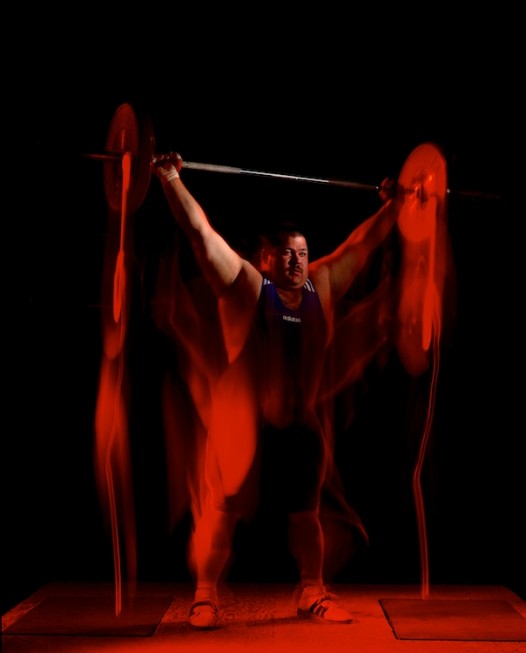The above photo of Olympian Shane Hamman, who is often referred to as the strongest man in America, was a hard won photograph. It wasn’t a tour de force technically, and it wasn’t days in the making. It was simply, as always, difficult to liaise with an Olympic athlete as he or she is in training for the games. Anything outside of their strict practice regimen, such as a photo shoot, gets assessed thoroughly, and the time allotted to such adventures is small indeed. The pic of him leaping, for instance, was done in a very short amount of time. He could only launch his massive frame in the air perhaps seven or eight times. That means the whole take is just a few frames, shot on 4×5. He was also gracious enough to give me time to work out another scenario, below.
The leaping picture was published by Nat Geo, and the magazine liked it well enough that they considered making a poster out of it at the time, and using it as a “subscriber inducement.” I talked it out with them and pointed out that really constituted a commercial application of the photo, and I did not have a commercial release. They would have to go back to the athlete and negotiate such a permission. Ya gotta be careful, and respectful, about this stuff. They eventually opted out of doing such a poster.
Just recently, as happens in the wild and woolly world of the internet, we stumbled across the jumping pic being deployed, without our permission, as a promotional effort on the part of a commercial enterprise. This is hardly a first, of course, in terms of our pictures, or anyone’s pictures. There are those out there in electronic publishing who deem that, as my editor Bill Douthitt at Geographic wryly puts it, “Content wants to be free.” We, uh, don’t subscribe to that theory.
Alerted to the incursion by Lynda Peckham, who has an amazing eye for details and keeps the studio on track, Lynn, our ever elegant and precise studio manager, wrote the offending party a letter, and I thought her explanation was so calm and so lucid that it was worthwhile sharing here. (Lynn is the grown up at our studio, and takes the lead in situations like this, and keeps everyone calm. Drew, Cali and I were already in the chopper, in camo face paint , planning refueling stops, etc. But her civilized, reasoned approach prevailed.) Her letter is below.
Thanks for your email, and for the removal of the image from your website.
You seem to have your own interpretation of the law here. Yes, you are right, there are many other folks who have infringed on Joe’s image of Shane, for their own purposes. But the photo of Shane is a small example of the hundreds and hundreds of others who have committed this crime with other work of Joe’s, and other photographers’ work as well. Just because images show up on a google image search does not mean that they are free for the taking. It’s the curse of the internet.
For someone like Joe, who has a career spanning 30 years, shooting for National Geographic, LIFE & Sports Illustrated, amongst about 100 other clients, and is a well known photographer, his work has of course had wide dissemination. In the last 365 days, for instance, there have been well over two million page views of his website. It’s thus a bit difficult to keep up with all of the rip-offs that are going on whenever he posts images. We can’t be watermarking every single file, given the volume of work he outputs, and in so many avenues for distribution. I’d have to hire someone to just sit here in the studio and do nothing but track down all of the people out there who have technically “stolen” these image files.
Most infringers, like yourself, blatantly feel that they can get away with it, while others are just oblivious to the laws involved. You might think that usage on a blog or website, that isn’t directly bringing in revenue that you are profiting from, exonerates them from infringement. Not the case. The fact of the matter is that the image(s) in question are, in fact, helping the infringer to market and promote their company, or, as you noted,
“My only intention for using it was to promote the sport and training methods of Olympic Weightlifting…”
Hence, a promotional effort, on your company’s behalf. As a spokesperson for “Olympic Weightlifting”, you are bringing your information to the readership of your blog and website, which they find intriguing and interesting and continue to come back for more. No matter how innocent you want to portray your side of this, it still comes down to marketing and promotion for your company. We have many inquiries from companies who understand the law, and by conducting themselves in an ethical manner, they inquire about the licensing fee to use an image on their website.
When you say that if you posted a photo yourself or someone else online and found it being used in an unauthorized way, my immediate response to that is…. if it’s a photo you took of yourself, or had a non-professional photographer take it and didn’t have a problem with it, well then, no worries. But if you snapped a photo of someone else (hence you own the copyright to the image file) and that image was used in an unauthorized way, the person you need to worry about (other than yourself being infringed upon), is the person you took the photo of. Without a model release from that person, you could very easily be sued by that person – especially if they wanted no association what-so-ever with the company that ripped off your photo.
I could go on and on, but no need for me to give you an unrequested “photographic business practices” lesson 🙂
On another note, I have nothing but respect for your pursuit to educate your clients and blog followers in the world of fitness and strength training. It so happens that I have four family members who are professional trainers and live to promote the field, so I totally have reverence.Anyway, glad we settled this matter peacefully. Not that I expected otherwise. Anything harder than what we did would require time, expense, and aggravation 🙁
Best, Lynn
A bit of his correspondence below:
Lynn,
I appreciate you taking time to explain the situation. I am fairly aware and do agree with everything you stated. I guess for us daily bloggers and even worse the FB crowd, we get used to posting and sharing whatever is available and assuming others will do the same. Desensitized I guess you might say. I have been asked to remove a handful of things over the last 5 years and I always do if I improperly used someone else’s material, as I did in this case.
I apologize for the inconvenience I caused you in having to contact me on the issue and again appreciate your solid explanation. I will think twice about what I’m “stealing” in the future.
As the parole board said to Hi McDunnough (on several occasions)….”Well okay then….”
The gent in question does seem like decent fellow, and the whole thing was conducted amiably. But in his response there were a couple, well warning bells, I guess you’d call them. The term “fairly aware,” for instance. Just like you can’t get a little bit pregnant, you really can’t be “fairly aware.” When you swipe someone else’s photo for your own use without their permission, that’s a full state of awareness, right there. Likewise his syntax, using quotation marks around the word “stealing,” which presumably softens the term, and makes it kinda, sorta, like, maybe stealing.
Sorry. When you take something that’s not yours, that’s stealing. No quotations marks necessary.
More tk…..
















Nice piece, but to drum home the point a little accuracy would be more persuasive. People need to learn this stuff, but to do that they need to understand what is wrong with what they are doing.
He didn’t, technically, steal, to permanently deprive the owner the use of, and to suggest he did lessens your well made point. Further, people don’t equate what he did to stealing because you can still sell the image, this is not fair, but is how people think.
He did infringe on your rights, that is against the law, we need to spend more time on educating people on rights with regards images rather than use knee jerk terms like “stealing”, particularly when they are inaccurate.
Amen. Maybe someday my pictures will be good enough that someone will want to steal them . . . 🙂
No offense, byt Lynda used the exact same syntax when she said ‘technically “stolen” these pictures’.
Calling infringement theft is intellectually lazy and dishonest, something both letter writers seemed cognizant of.
Ergo; I believe your presumption is mistaken. The quotes are not there to “soften the term”. It’s likely there to make clear the author understand that copyright infringement is not at all theft.
As for the “fairly aware” there’s an argument to be made that the world works differently for a majority of us today, than it does for you. Self publishing, digital distribution, individual news, aggregation, crowd sourcing, instantaneous community building and outreach; these things are increasingly outpacing the traditional models of dead tree prints, publishers and the physical value chain. At least in terms of content produced and eyeballs reached, if not monetary value.
My point being; our current laws does not reflect our societies’ de-facto use cases, nor – in many cases – our values. Thus “fairly aware” is probably a hint that, yes – the author knows the literal law. But it’s not how society actually works for most of us, most of the time.
Thanks for all your work man! I find you a continual source of inspiration and insights. I was unfortunately not able to attend GPP this year, but I hope to get away next time. Have there been any discussions about maybe doing the Flash Bus tour in Europe?
So well stated and such a problem today. Brilliant response, Lynn!
Yeh it is very sad that things like this are keep happening all the time but now days it seems so easy just to “copy” an image and use it for “whatever” …. as in this case copy means stiling . It is just so easy that most people don’t even consider it as doing anything wrong. I think what the Google should do is some kind of message popping out with all the info necessary when someone is trying to copy an image online. Not that will prevent it but at least may wake up someones conscious.
True enough, Lynn did use quotes around stolen. She generally, in her missives, especially in her first contact, is rather soft spoken.
The difficulty in protecting one’s property is that it is easily accessible, and difficult to find infringers and make them responsible for the theft. Copyright law permits legal action and damages, if the copyright is registered, and attorneys fees to be paid by the infringer. The difficulty is locating the infringer, bringing a federal case (and getting a lawyer to bring it) and then collecting it. No matter what we try to do to limit the availability, with watermarks, disabling clicks, etc., people can get around that. It is a problem of living a life on line, you have to police. People think it is victimless, and they will never be found. Not the case if people really take the effort to be vigilant. Thanks to Joe and Lynn for this information. Take Down notices can be a very powerful thing. I am sure he doesn’t want the press he is now getting from this.
Bill Bogle, Jr.
Well written, as always, Joe. It made me smile a little because I had to give Lynn’s exact lecture to my 9-year-old just last week. He and his science project partner found an image of Uranus via Google that they wanted to put on T-shirts for their presentation. Not so fast there, bucko! Ten minutes of careful explanation later, he decided the T-shirts were more trouble than they were worth. Hopefully, he’ll remember and evangelize to others going forward.
Honestly I’m pretty upset with the infringers response, and not for the reasons Joe pointed out. The guy readily admits that he has been caught infringing at least “a handful of times” over the last 5 years. There is no telling how many times he has infringed and not been caught. I suspect every single image that this person uses on their blog is illegally obtained. He know what he is doing is wrong, any yet he continues without any remorse or attempt to change his behavior.
Someone needs to throw the book at him in order for him to change. Otherwise he will continue to illegally use material.
Just my thoughts on the matter…..
I am responding to Ben’s post. Copyright infringement can take many forms. Taking a photo that you have no connection to whatsoever and using it to promote a commercial venture is one of them; is stealing. You took it. Id est, stealing.
On another note, I really appreciate this post Mr. McNally. In this day and age of “content wants to be free” we as artistis need to be as fervent as ever in putting a stop to blatant infringement.
I, too, sir, do not subscribe to that theory.
Hudson Handel
IMHO, Joe,…this letter writing practice of asking a dirty-scum-bag-thief to “please” stop stealing my works, stop taking food off my family’s table, etc., only minimizes the quality of my art, and the seriousness of the crime.
If someone stole the Mona Lisa, do you think the authorities would write “them” a cease & desist letter?
First response should be a letter to the lawyers,…”Please peruse this violation to the fullest extent of the law,…PS: Please send me their home address too,…thanks!”.
There is something called ‘fair use’, it’s found here:
http://www.copyright.gov/fls/fl102.html
Also, everything posted on the internet must be reproduced by each and every visitor to that webpage. It can’t be seen by anyone unless it’s first downloaded to the visitor’s computer. If you don’t want the content reproduced, you shouldn’t put it on the internet. So, the only issue with internet content is what it’s used for. It’s clear that you can’t use someone else’s original materal for commercial purposes without their permission.
Many internet forums allow users to include coies of quotes of other users (without permission). Is that a copyright issue since the forum page includes advertizing?
Hi Joe,
I’m great fan of your work. I’m just curious, according to lawyer Ed Greenberg interviewed by Kelby Training you should never contact the offender directly in any form including letters. You should just gather the evidence of the infringement and submit it to an intellectual property lawyer and supposedly it is very common and fast to reach a settlement without having to go to court. Anyway, that is what he says, maybe you have a different experience and suing is a big pain in the …?
This person above has clearly stated that he has had to take down a handful of photos in the last 5 years (repeated offender that will most likely steal again)and I bet you that if he had to sell his kidney for a settlement he would stop this behavior.
But please, don’t stop posting your pics online, they are an inspiration for all of us!
This article makes me wonder what if Hi McDonnough’s getaway driver (albeit innocent getaway driver) had used quotation marks when he said “son, there’s a panty on your head”?
Actually, I just did use quotation marks.
Okay, then.
Two lessons here. First, we should all know that stealing is wrong, criminal, unethical, etc. Whether in quotes or not. I’m hopeful that everyone reading this blog understands that. But I don’t like to assume.
The second lesson. Don’t piss off Lynn.
Regards to all at the studio.
John
Ps. Lynn – thanks for keeping Joe, Drew and Cali away from the helicopter and camo face paint this time and for keeping the troops focused. You guys are a great team.
“Drew, Cali and I were already in the chopper, in camo face paint , planning refueling stops, etc.”… this was the best part!!! Can´t stop laughing…
Great post Joe! Two thumbs up!
Great post. There seems to be some discussion if unauthorized use is “theft”. Well, I’m no lawyer and I don’t play one on T.V. but I do believe in certain circumstances there can be a theft of intellectual property which includes copyrighted artwork (photographic imagery). In any case I certainly feel as if it is “theft” and Lynn used in in proper context.
And, kudos to you Joe for making an issue of this. It helps all of us in the industry.
Hey all:
Thanks very much for your responses to my communication with the person who used Joe’s image in an unauthorized way. Have to say though, the friendly debate here over the use of quotation marks and reference to words like “stealing” and “stolen” is rather interesting. When I said (to the offender) that there are people out there who have technically “stolen” image files, it was really just my way of making a point (outside of a court of law). By nature, if the circumstances require it, I generally choose to engage in “friendly confrontation”. When I spoke with the offender on the phone, it was a good natured conversation and our exchange was very conciliatory. I got my point across, he removed the image, and that was that. We all have to choose our battles. I wasn’t going to invest any more time then I did, scolding him and driving the point home, because there are much greater battles to fight…. like a client who wants Joe to do a shoot for an exclusive, unlimited, all rights, in perpetuity license… and only has peanuts to offer. Don’t get me started.
Thanks again – I really appreciate everyone’s comments!
@HUdson Handel: I guess you were responding to my comment?
You said: “Copyright infringement can take many forms. Taking a photo […] and using it […] is stealing. You took it. Id est, stealing.”
So look, we’re likely from different countries. But in any legal system I know of there are very clear distinctions between depriving someone of their property (= theft) and unauthorized used of copyrighted works (= infringement).
I understand it’s a convenient rhetoric to scandalize the transgression, but it is untrue and unproductive. As you can see from many of the commenters here, the knee-jerk response is to damn modern technology, curse the lack of morals of our society and shout for new legislations and (impossible) digital locks.
Litigation and shaming is a dead end. Neither morals, tech nor law will bend to accommodate your business model.
A much more productive line of reasoning is to see the vast possibilities inherent in these new dynamics, and adjust your business model to exploit them efficiently.
Joe is an established photographer and the value chain that supports him will likely be around in some form for long enough for him to retire comfortably. But the vast majority of us will do better to move away from the “price per copy” models and embrace the economy of abundance.
Mike Masnick did a good job explaining how that works. It’s less than two minutes: http://www.techdirt.com/articles/20091020/1519476609.shtml
Hey Ulf: Thanks very much for your feedback. I love your perspective, truly. Although, semantics aside, the fact that we’re from different countries, IMO, has no bearing here. Your line of reasoning is right on the money (literally), no matter where in the world we practice business. I’m just not sure if the photo industry, for one, is ready to embrace the steps necessary to practice the economy of abundance (Masnick’s video was a helpful and simple way to see this – thanks for sharing). Historically, we’ve all been so mired down in the exercise of finger pointing and litigation that we’ve lost sight of the ability to encourage the need to change with the times.
Thanks again, I really appreciate your point of view.
I do not have a PhD in law… or anything else for that matter, but to me, copyright infringement is theft period, no matter what technical jargon you throw on it.
Joe, good for you for standing up for your work, and its awesome that you have someone like Lynn who can not only get things done but also do it with class. Being able to diffuse a situation is way better than letting the bomb go off imho.
Lynn: 1 – Infringer:0
Good Job, Lynn!
“I’m just not sure if the photo industry, for one, is ready to embrace the steps necessary […]”
Indeed. But we’ve seen this transformation many times now and my bet is the photo industry will evolve just like the others did.
The music industry is almost there, with subscription services, pay what you want, crowd funding etc. (and, it should be noted, iTunes pretty much made the old price-per-copy model work again too – mostly by providing extraordinary convenience).
TV and movies are slowly catching up, but they’re way behind a reasonable solution yet. Still struggling with silly stuff like region locking, release staggering, proprietary software players, prohibitive pricing and DRM. Films doesn’t yet provide anything like Spotify or Steam. Going to the physical cinema is currently the least painful way of accessing the medium.
Video games (my industry) are way ahead of both – with most revenue today (outside of the niche that is big brand AAA-productions) being made by in-game purchases, subscriptions or hardware. Thus; consumer piracy is an immense benefit for most of us. Sharing leads to eyeballs leads to engagement leads to monetization.
My original point was in that sense; that Joe is triple-A while the vast majority of us are working on mobile. So – like some smart mouth once said; – “There are no new ideas. Only old men that die.”
… no offense Joe. 😛
I prefer the camo face paint approach. After all, you can only sue people with money. For everything else- there’s a cinderblock, a chain and a deep enough river.
It’s an ongoing war (Image stealing) often fought with/without knowledge of it’s causes and outcomes. Lynn’s letter was awesome, stayed in limits and with steel fists, got the point across. At this point, I would like to know if sharing the photos on facebook (not for commercial pages; just personal account) would also be an infringement. If that’s the case, I would need to take down the image of Kurt Cobain from my profile. Best regards
Joe – I like the helicopter, camo approach myself.
I had this happen once. The thief told me I should be “honored” he used my photo. So I contacted Nikon asking for my money back on the lens I used since they should be honored that I used it for that photo. Surprisingly it didn’t work …